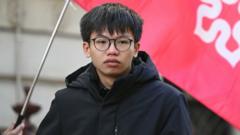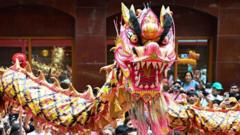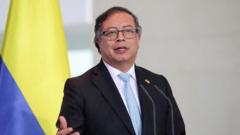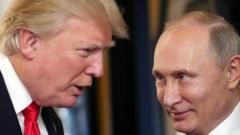The move intensifies the crackdown on dissent and raises concerns about transnational repression of pro-democracy advocates.
**Hong Kong's Police Issue Bounties on Exiled Pro-Democracy Activists**

**Hong Kong's Police Issue Bounties on Exiled Pro-Democracy Activists**
Hong Kong authorities are offering substantial rewards for information on six activists residing abroad.
The Hong Kong Police have recently announced the issuance of arrest warrants for six pro-democracy activists living in the United Kingdom and Canada, offering a reward of HK$1 million (approximately £103,000 or $129,000) for information leading to their capture. The wanted individuals include notable figures such as Tony Chung, the former leader of a pro-independence group, currently residing in the UK after fleeing Hong Kong last year.
The targeted group consists of various advocates, including former district councillor Carmen Lau, activist Chloe Cheung, and commentator Chung Kim-wah, among others. They stand accused of breaching Hong Kong's stringent national security law, specifically charges of inciting secession, subversion, and colluding with foreign entities. Human Rights Watch has denounced these arrest warrants as a form of intimidation aimed at silencing opposition within Hong Kong and has urged the UK and Canadian governments to respond vigorously.
Tony Chung, who has endured previous convictions for advocating Hong Kong's independence, expressed via social media that the recent developments were expected, acknowledging the risks he faced upon leaving the city. He noted the challenges of being a wanted activist, especially in light of the law's implications for dissent.
Carmen Lau, also based in the UK, reaffirmed her commitment to advocating for Hong Kong's democracy, urging Western governments to impose sanctions against those violating human rights in the region. She also encouraged a reassessment of strategies to combat transnational repression against Hong Kong activists.
This is not the first instance of Hong Kong issuing bounties on activists since the National Security Law's implementation in 2020. Previous rounds of warrants were released in July and December of last year, targeting well-known figures like Nathan Law and Simon Cheng, both currently living in the UK.
The international community remains divided over Hong Kong's security law, which Beijing claims is essential for stability. Critics, however, assert that it undermines freedoms and curtails citizens' rights to protest and voice dissent against the government.
The targeted group consists of various advocates, including former district councillor Carmen Lau, activist Chloe Cheung, and commentator Chung Kim-wah, among others. They stand accused of breaching Hong Kong's stringent national security law, specifically charges of inciting secession, subversion, and colluding with foreign entities. Human Rights Watch has denounced these arrest warrants as a form of intimidation aimed at silencing opposition within Hong Kong and has urged the UK and Canadian governments to respond vigorously.
Tony Chung, who has endured previous convictions for advocating Hong Kong's independence, expressed via social media that the recent developments were expected, acknowledging the risks he faced upon leaving the city. He noted the challenges of being a wanted activist, especially in light of the law's implications for dissent.
Carmen Lau, also based in the UK, reaffirmed her commitment to advocating for Hong Kong's democracy, urging Western governments to impose sanctions against those violating human rights in the region. She also encouraged a reassessment of strategies to combat transnational repression against Hong Kong activists.
This is not the first instance of Hong Kong issuing bounties on activists since the National Security Law's implementation in 2020. Previous rounds of warrants were released in July and December of last year, targeting well-known figures like Nathan Law and Simon Cheng, both currently living in the UK.
The international community remains divided over Hong Kong's security law, which Beijing claims is essential for stability. Critics, however, assert that it undermines freedoms and curtails citizens' rights to protest and voice dissent against the government.





















